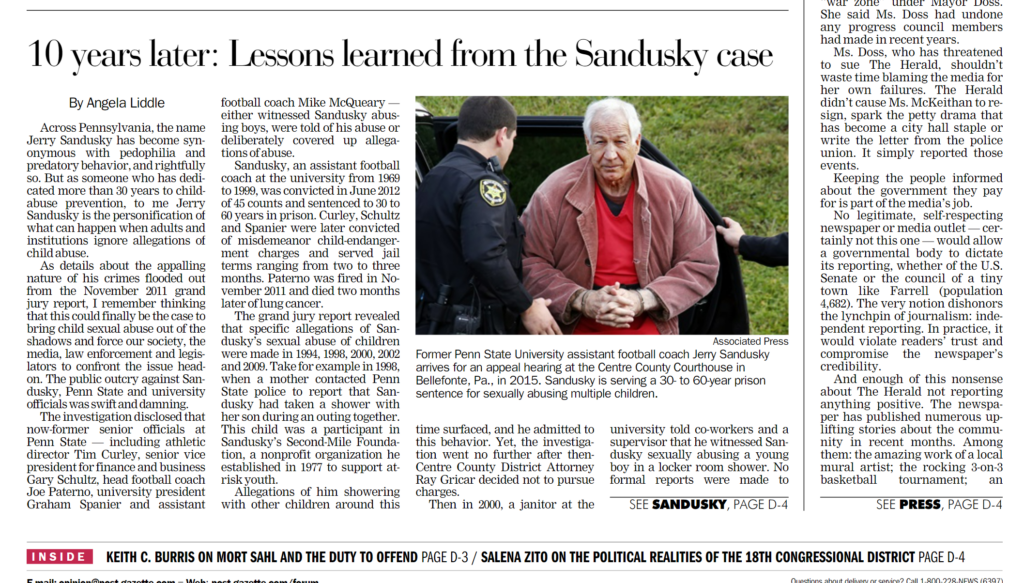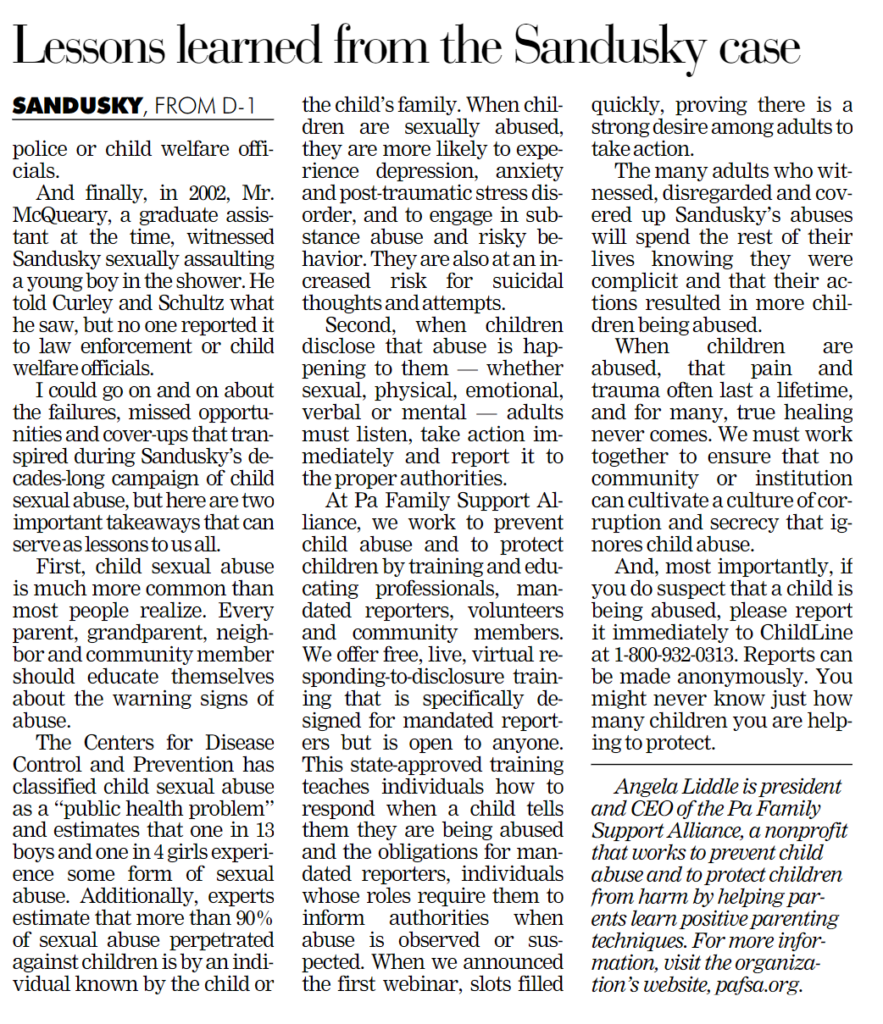Pittsburgh Post-Gazette: Op-ed – 10 years later: Lessons learned from the Sandusky case
Across Pennsylvania, the name Jerry Sandusky has become synonymous with pedophilia and predatory behavior, and rightfully so. But as someone who has dedicated more than 30 years to child-abuse prevention, to me Jerry Sandusky is the personification of what can happen when adults and institutions ignore allegations of child abuse.
As details about the appalling nature of his crimes flooded out from the November 2011 grand jury report, I remember thinking that this could finally be the case to bring child sexual abuse out of the shadows and force our society, the media, law enforcement and legislators to confront the issue head-on. The public outcry against Sandusky, Penn State and university officials was swift and damning.
The investigation disclosed that now-former senior officials at Penn State — including athletic director Tim Curley, senior vice president for finance and business Gary Schultz, head football coach Joe Paterno, university president Graham Spanier and assistant football coach Mike McQueary — either witnessed Sandusky abusing boys, were told of his abuse or deliberately covered up allegations of abuse.
Sandusky, an assistant football coach at the university from 1969 to 1999, was convicted in June 2012 of 45 counts and sentenced to 30 to 60 years in prison. Curley, Schultz and Spanier were later convicted of misdemeanor child-endangerment charges and served jail terms ranging from two to three months. Paterno was fired in November 2011 and died two months later of lung cancer.
The grand jury report revealed that specific allegations of Sandusky’s sexual abuse of children were made in 1994, 1998, 2000, 2002 and 2009. Take for example in 1998, when a mother contacted Penn State police to report that Sandusky had taken a shower with her son during an outing together. This child was a participant in Sandusky’s Second-Mile Foundation, a nonprofit organization he established in 1977 to support at-risk youth.
Allegations of him showering with other children around this time surfaced, and he admitted to this behavior. Yet, the investigation went no further after then-Centre County District Attorney Ray Gricar decided not to pursue charges.
Then in 2000, a janitor at the university told co-workers and a supervisor that he witnessed Sandusky sexually abusing a young boy in a locker room shower. No formal reports were made to police or child welfare officials.
And finally, in 2002, Mr. McQueary, a graduate assistant at the time, witnessed Sandusky sexually assaulting a young boy in the shower. He told Curley and Schultz what he saw, but no one reported it to law enforcement or child welfare officials.
I could go on and on about the failures, missed opportunities and cover-ups that transpired during Sandusky’s decades-long campaign of child sexual abuse, but here are two important takeaways that can serve as lessons to us all.
First, child sexual abuse is much more common than most people realize. Every parent, grandparent, neighbor and community member should educate themselves about the warning signs of abuse.
The Centers for Disease Control and Prevention has classified child sexual abuse as a “public health problem” and estimates that one in 13 boys and one in 4 girls experience some form of sexual abuse. Additionally, experts estimate that more than 90% of sexual abuse perpetrated against children is by an individual known by the child or the child’s family. When children are sexually abused, they are more likely to experience depression, anxiety and post-traumatic stress disorder, and to engage in substance abuse and risky behavior. They are also at an increased risk for suicidal thoughts and attempts.
Second, when children disclose that abuse is happening to them — whether sexual, physical, emotional, verbal or mental — adults must listen, take action immediately and report it to the proper authorities.
At Pa Family Support Alliance, we work to prevent child abuse and to protect children by training and educating professionals, mandated reporters, volunteers and community members. We offer free, live, virtual responding-to-disclosure training that is specifically designed for mandated reporters but is open to anyone. This state-approved training teaches individuals how to respond when a child tells them they are being abused and the obligations for mandated reporters, individuals whose roles require them to inform authorities when abuse is observed or suspected. When we announced the first webinar, slots filled quickly, proving there is a strong desire among adults to take action.
The many adults who witnessed, disregarded and covered up Sandusky’s abuses will spend the rest of their lives knowing they were complicit and that their actions resulted in more children being abused.
When children are abused, that pain and trauma often last a lifetime, and for many, true healing never comes. We must work together to ensure that no community or institution can cultivate a culture of corruption and secrecy that ignores child abuse.
And, most importantly, if you do suspect that a child is being abused, please report it immediately to ChildLine at 1-800-932-0313. Reports can be made anonymously. You might never know just how many children you are helping to protect.
Angela Liddle is president and CEO of the Pa Family Support Alliance, a nonprofit that works to prevent child abuse and to protect children from harm by helping parents learn positive parenting techniques. For more information, visit the organization’s website, pafsa.org.
From Pittsburgh Post-Gazette, November 7, 2021


Leave a Reply
You must be logged in to post a comment.
337 Comments